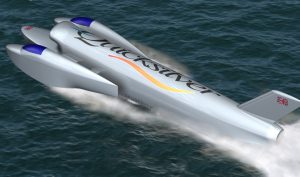For many members whose formative years were in the 1940s and 1950s when Britain was still at the forefront of technological developments, today’s presentation offered a fascinating cocktail of patriotic nostalgia mixed with anticipation of the future. Our speaker ‘cast off’ by outlining the 100-year old history of speed on water and setting the scene for a project he is leading which aims to bring the record back to Britain.
Nigel Macknight began by showing a short film about the record-breaking exploits of Donald Campbell and his father, Sir Malcolm Campbell, with their legendary Bluebird cars and boats. Nigel explained that, when Donald Campbell was killed in January 1967, he was a schoolboy living at Preston in Lancashire, and was so influenced by the tragic event that in his late teens he attempted to restart the Bluebird project with the assistance of Campbell’s former chief mechanic, Leo Villa and Ken Norris, the co-designer of Donald’s Bluebirds. After 18 months of trying, however, Nigel gave up on the dream, realising he was “a boy trying to do a man’s job” –well out of his depth in setting himself such a massive challenge.
Although this was a bitter disappointment, Nigel went on to forge a successful career as a freelance author, working in the fields of aviation, space exploration, Formula 1, show business and sport. He had over a dozen books published and had interviewed many well-known personalities, ranging from Seb Coe to Tommy Cooper to Buzz Aldrin. In the early 1980s, the iconic Eagle comic was relaunched and Nigel was one of its regular contributors. In April 1981, Nigel travelled to the Kennedy Space Centre in Florida to witness the first launch of the Space Shuttle, This led to him writing and publishing a best- selling book about the Shuttle. The forward for this book was written by the Leader of the Red Arrows, and Nigel was lucky enough to fly as a passenger on two occasions from their base at RAF Scampton in Lincolnshire. This famous flight was the subject of another book, selling 50,000 copies.
With success as a writer and publisher looking like his life’s future course, our speaker took a gamble and set about once more to enter the world of speed records. His project is called “Quicksilver”. A futuristic jet powered boat –using an ex RAF Buccaneer engine providing up to 10,000HP- is now taking shape and she should be capable of speeds in excess of 300 mph. She weighs in at 3.5 tons with a length of 40ft and width of 20ft. To aid balance and reduce the inclination to ‘take off’ there would be two cockpits allowing the engine and its weight to be placed nearer the front. The intention is to wrest the World Water Speed (currently 317.6 mph) record from the hands of its current holder, Australia. Nigel showed us a short film summarising the history of the record. Holders and contenders have included several names not traditionally associated with speed records. For example, a boat designed by the American inventor Alexander Graham Bell set a speed of 70 mph as early as 1919, and “Lawrence of Arabia” was closely involved with a boat called Empire Day which ran on Lake Windermere but suffered engine overheating problems.
Nigel concluded by showing us a film about the recovery from Coniston Water of Donald Campbell’s famous “Bluebird” in 2001. The boat is now being rebuilt prior to being placed on display at the Ruskin museum in Coniston. He shared with us some the technical difficulties of breaking the World Water Speed record such as the craft’s stability, drag, lift, tensile strength and fuel supply. Maximum use was being made of the latest electronics and carbon fibre materials as well as more traditional steel, aluminium and even balsa wood. The project had been greatly aided both financially and practically by a number of High-Tec firms and the use of University research facilities in return for student development opportunities. There is a club for individual supporters. More information can be found at www.quicksilver-wsr.com
“Quicksilver”, Nigel predicted, would look at a distance like a drop of mercury racing over the water- hence her name. Her completion is planned in two years. May she safely bring back the record to Britain!

